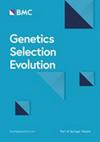A million-cow genome-wide association study of productive life in U.S. Holstein cows
IF 3.1
1区 农林科学
Q1 AGRICULTURE, DAIRY & ANIMAL SCIENCE
引用次数: 0
Abstract
Productive life (PL) of a cow is the time the cow remains in the milking herd from first calving to exit from the herd due to culling or death and is an important economic trait in U.S. Holstein cattle. The large samples of Holstein genomic evaluation data that have become available recently provided unprecedented statistical power to identify genetic factors affecting PL in Holstein cows using the approach of genome-wide association study (GWAS). The GWAS analysis used 1,103,641 Holstein cows with phenotypic observations on PL and genotypes of 75,282 single nucleotide polymorphism (SNP) markers. The statistical tests and estimation of SNP additive and dominance effects used the approximate generalized least squares method implemented by the EPISNPmpi computer program. The GWAS detected 5390 significant additive effects of PL distributed over all 29 autosomes and the X–Y nonrecombining region of the X chromosome (Chr31). Two chromosome regions had the most significant and largest cluster of additive effects, the SLC4A4-GC-NPFFR2 (SGN) region of Chr06 with pleiotropic effects for PL, fertility, somatic cell score and milk yield; and the 32–52 Mb region of Chr10 with peak effects for PL in or near RASGRP1 with many important immunity functions. The dominance tests detected 38 significant dominance effects including 12 dominance effects with sharply negative homozygous recessive genotypes on Chr18, Chr05, Chr23 and Chr24. The GWAS results showed that highly significant genetic effects for PL were in chromosome regions known to have highly significant effects for fertility and health and a chromosome region with multiple genes with reproductive and immunity functions. SNPs with rare but sharply negative homozygous recessive genotypes for PL existed and should be used for eliminating heifers carrying those homozygous recessive genotypes.关于美国荷斯坦奶牛生产寿命的百万头奶牛全基因组关联研究
奶牛的生产寿命(PL)是指奶牛从第一次产犊到因淘汰或死亡而退出挤奶牛群的时间,是美国荷斯坦牛的一个重要经济性状。最近获得的大量荷斯坦基因组评估数据样本为利用全基因组关联研究(GWAS)方法确定影响荷斯坦奶牛PL的遗传因素提供了前所未有的统计能力。GWAS 分析使用了 1,103,641 头荷斯坦奶牛的 PL 表型观测数据和 75,282 个单核苷酸多态性 (SNP) 标记的基因型。对SNP加性效应和显性效应的统计检验和估计采用了EPISNPmpi计算机程序实现的近似广义最小二乘法。GWAS 检测出了 5390 个 PL 的显著加性效应,分布在全部 29 个常染色体和 X 染色体的 X-Y 非重组区(Chr31)。两个染色体区域具有最显著和最大的加性效应群,一个是 Chr06 的 SLC4A4-GC-NPFFR2 (SGN) 区域,该区域对 PL、繁殖力、体细胞评分和产奶量具有多向效应;另一个是 Chr10 的 32-52 Mb 区域,该区域的 PL 在 RASGRP1 或其附近具有峰值效应,而 RASGRP1 具有许多重要的免疫功能。显性检验发现了 38 个显著的显性效应,包括 12 个在 Chr18、Chr05、Chr23 和 Chr24 上具有显著负同源隐性基因型的显性效应。GWAS 结果显示,PL 的高度显著遗传效应位于已知对生育和健康有高度显著影响的染色体区域,以及一个含有多个具有生殖和免疫功能基因的染色体区域。SNPs对PL的同源隐性基因型罕见但呈显著负性,应用于淘汰携带这些同源隐性基因型的小母牛。
本文章由计算机程序翻译,如有差异,请以英文原文为准。
求助全文
约1分钟内获得全文
求助全文
来源期刊

Genetics Selection Evolution
生物-奶制品与动物科学
CiteScore
6.50
自引率
9.80%
发文量
74
审稿时长
1 months
期刊介绍:
Genetics Selection Evolution invites basic, applied and methodological content that will aid the current understanding and the utilization of genetic variability in domestic animal species. Although the focus is on domestic animal species, research on other species is invited if it contributes to the understanding of the use of genetic variability in domestic animals. Genetics Selection Evolution publishes results from all levels of study, from the gene to the quantitative trait, from the individual to the population, the breed or the species. Contributions concerning both the biological approach, from molecular genetics to quantitative genetics, as well as the mathematical approach, from population genetics to statistics, are welcome. Specific areas of interest include but are not limited to: gene and QTL identification, mapping and characterization, analysis of new phenotypes, high-throughput SNP data analysis, functional genomics, cytogenetics, genetic diversity of populations and breeds, genetic evaluation, applied and experimental selection, genomic selection, selection efficiency, and statistical methodology for the genetic analysis of phenotypes with quantitative and mixed inheritance.
 求助内容:
求助内容: 应助结果提醒方式:
应助结果提醒方式:


